好莱坞知名导演夫妇疑遭儿子谋杀,发生了什么?
好莱坞知名导演夫妇疑遭儿子谋杀,发生了什么?






中国深圳法院对六起走私锑锭系列案进行公开宣判。其中,对涉案数量最大的主犯判处有期徒刑12年,并处罚金100万元人民币(18.3万新元),对另外26人判处有期徒刑五年至拘役四个月不等刑罚,并处罚金。
据深圳市中级人民法院微信公众号,深圳市中级法院星期二(12月16日)对深圳市检察院指控被告人王武彬等27人实施的六起走私锑锭系列案进行了公开宣判。其中,对涉案数量最大的主犯王武彬以走私国家禁止进出口的货物罪判处有期徒刑12年,并处罚金100万元,对周楚升、罗钒、胡喜坤等26人,根据各自走私数量、地位作用等事实、情节分别以走私国家禁止进出口的货物罪,判处有期徒刑五年至拘役四个月不等刑罚,并处罚金。
法院称,经审理查明,2025年2月至3月期间,王武彬与境外走私团伙合谋或接受委托,在未取得两用物项出口许可的情况下,组织部分被告人分别帮其购买锑锭、夹藏伪装、虚假申报等,将锑锭走私出境,系该系列案中涉案数量最大、地位作用最突出的主犯。周楚升、罗钒、胡喜坤等或与其他被告人交叉结伙或单独,以夹藏伪装、虚假申报等方式,实施、参与走私锑锭犯罪。全案共计走私锑锭166余吨,海关查扣96余吨。
根据中国商务部官网11月9日消息,经批准,自即日起至明年11月27日,商务部公告2024年第46号(《关于加强相关两用物项对美国出口管制的公告》)第二款暂停实施。
中国商务部去年12月发布的第46号公告,第二款内容为“原则上不予许可镓、锗、锑、超硬材料相关两用物项对美国出口;对石墨两用物项对美国出口,实施更严格的最终用户和最终用途审查。”
两用物项是指既可用于民用,也可用于军事用途的材料。
中国国家主席习近平和美国总统特朗普10月底在韩国会晤后,两国同意互降关税,并暂停此前对彼此采取的部分惩罚性措施。
中国驻美国大使馆提醒在美中国公民,进行海外公民登记。
“中国驻美国大使馆”微信公众号星期二(12月16日)发文称,为充分发挥信息化手段优势,进一步帮助海外中国公民更好获得领事保护与服务,外交部“中国领事”APP推出“海外公民登记”功能模块并已全面上线。
中使馆提醒在美中国公民,积极扫码下载“中国领事”APP,并参与登记。
中使馆称,登记时应确保所填信息真实、准确、完整,信息将受到严格保护,登记不会要求提供银行账户。
中国驻日本大使馆12月11日也发布提醒称,为有效保护在日中国公民人身安全,进一步帮助在日中国公民更好获得领事保护与服务,请在日中国公民积极下载“中国领事”APP或通过“中国领事”微信、支付宝小程序参与登记。
针对中国大陆福建舰第一次航经台湾海峡,台湾国防部部长顾立雄说,台军有全程监控,发布照片也显示福建舰上面并无舰载机,预判福建舰是要回到上海长兴岛进行相关缺点改进。
综合《联合报》、三立新闻网、中央广播电台网报道,台湾立法院外交及国防委员会星期三(12月17日)邀请顾立雄、台湾的国家安全局局长蔡明彦报告“台海与周边潜在军事冲突热点情势分析与国军战备应变整备情形”,并备质询。
民进党立委罗美玲询问,福建舰第一次经过台湾海峡,此次举动有什么异常的地方吗?
对此,顾立雄回应称,台军有全程监控,发布照片也显示福建舰上面并无舰载机,预判是要回到上海长兴岛进行相关缺改。
顾立雄也说,目前观察此次福建舰通过台湾海峡,并无任何军事意图,台湾国防部将持续严密监控。
台湾国防部星期三公布大陆解放军在台海周边动态图。其中,福建舰星期二(12月16日)航经台湾海峡。台湾国防部也公开相关监控画面。
台湾国防部说,福建舰11月在海南三亚正式入列成军后,首度出航即穿越台湾海峡,台军依既有机制即时应处,确保区域安全与稳定。面对解放军相关动态,台湾国防部强调,台军运用任务机、舰及岸置导弹系统,全程掌控大陆军舰航行状况。



© Associated Press
知情人士称,中国瑞幸咖啡正考虑竞购雀巢旗下的蓝瓶咖啡,以提升品牌形象并拓展高端咖啡市场。
彭博社引述知情人士报道,中国最大的咖啡连锁品牌瑞幸咖啡及品牌投资方大钲资本,也在评估其他收购目标,包括在中国区% Arabica咖啡门店的运营商。有关运营商的投资者包括私募股权公司PAG。
知情人士透露,瑞幸咖啡和大钲资本也曾考虑过收购可口可乐公司旗下的连锁咖啡品牌Costa Coffee,但相关交易推进的可能性不大。
瑞幸咖啡的美国存托凭证星期二(12月16日)下跌7.3%,创下4月以来最大单日跌幅。今年以来,瑞幸咖啡的美国存托凭证累计上涨25%,公司市值达到90亿美元(116.22亿新元)。
知情人士称,相关讨论仍处于早期阶段,最终可能不会达成收购协议。
瑞幸咖啡成立于2017年,如今有数千家门店,主打价格亲民的咖啡。瑞幸咖啡的增长势头强劲,在中国的门店数量已超越星巴克。
蓝瓶咖啡2002年在美国加利福尼亚州创立。15年后,雀巢投资该公司,斥资约4.25亿美元收购了68%的股份。除了美国外,蓝瓶咖啡在中国大陆、香港、日本、新加坡和韩国也设有门店。
由香港导演周冠威执导的电影《自杀通告》被禁止在香港上映。周冠威透露,他向香港有关部门申请公开上映时,得到的回复指这部电影上映会“不利国家安全”,因此被拒绝。
《自杀通告》以学生自杀为题材,反思教育理念、社会价值观以及家庭与学校的压力,今年11月在台湾上映。
周冠威星期二(12月16日)在脸书发文称,他今年8月4日向香港电影、报刊及物品管理部门申请上映,但等待逾四个月后才收到拒绝通知。
香港当局在回复中指出,经综合评估,影片上映“会不利于国家安全条例第10(2)(d)条”,因此不宜上映。回复还提醒,根据条例第7条,未经批准上映影片属犯罪,一经定罪可处100万港元(16.6万新元)罚款及三年监禁。
周冠威说,他已经咨询律师,曾经考虑司法覆核控告政府,“但律师意见不出所料,在司法崩坏的时代,控告政府,没有太大意义。如果败诉,更有可能被政府追讨过百万的诉讼费”。
他指出,《自杀通告》被列为禁片,“依据的法例只是写上这七个字‘不利于国家安全’,而再无进一步解释,国安法就是不用解释,荒谬、过分、粗暴、不公义,国安法遗祸香港,再多一个案例”。
周冠威说,《自杀通告》是商业电影,如今被动地变成政治事件,被认定为不利国家安全的电影,“香港上映不到,接受这个现实很痛苦”。他还说:“这套电影命途多坎坷,当然不只这套电影,包括我的电影事业,也包括——香港。”
台湾内政部预告修正草案,规定地方县市首长、涉及国安的公务员等人员,申请赴中国大陆探亲、奔丧亲属的亲等,由四等亲改为三等亲内后,大陆国台办回应,民进党费尽心机阻挠限制台湾民众到大陆,并指“这种滥权妄为的行径必遭民意唾弃”。
国台办星期三(12月17日)举行例行新闻发布会。有记者问,民进党拟修改“台湾地区公务员及特定身份人员进入大陆地区许可办法”,规定地方县市首长、部分公务员等人员,申请赴大陆探亲、奔丧亲属的亲等由四亲等内改为三亲等内;规范大部分公务员高阶主管与警官等赴大陆要提前七天申请。对此有何评论?
国台办发言人朱凤莲回答,这是民进党阻挠禁限两岸交流往来的又一恶行。她指出,民进党费尽心机阻挠限制台湾同胞到大陆,罗织罪名、打压迫害台湾积极参与两岸交流的团体个人,企图阻挡两岸同胞走近走亲,这种滥权妄为的行径必遭民意唾弃。
政治立场亲绿的《自由时报》上星期五(12月12日)报道,台湾内政部预告修正“台湾地区公务员及特定身份人员进入大陆地区许可办法”。修正草案指出,鉴于近年中共在大陆及香港、澳门积极诱拉台湾公务员,同时违法逮捕、羁押、盘查等案例不断累积,公务员赴大陆及香港澳门的人身安全风险日益升高,为配合强化公务员赴大陆的管理政策,因此提出修正草案。
许可办法原规定,担任台湾行政职务的政务人员、直辖市长、县市长、涉及“国家”安全、利益或机密业公务人员及涉及“国家”核心关键技术业务的人员,符合探视四亲等内亲属、从事业务相关活动或会议等五种情况可以申请进入大陆。
不过,台湾内政部称,为维护两岸交流安全,并考量实际需求,此次修法参考“大陆地区人民进入台湾地区许可办法”规定,就申请探亲、探病或奔丧的亲属,其亲等由四亲等内修正为三亲等内;另外,也规范未涉及国安的公务员高阶主管与警官等赴大陆,须提前七天申请。
台湾陆委会发言人梁文杰也说,这个规定已经实施非常多年,早年有不少台湾公务员是大陆迁移过来的,不少亲戚朋友在大陆,所以很多人有四等亲。
梁文杰还说,四等亲是指表哥、表妹,但这么多年下来,有些公务员滥用四等亲。例如一个受管制的公务人员,申请要去大陆探望表妹,要去探亲,这是社会不太能接受的;他说,所以把四等亲改为三等亲,三等亲是指叔叔、伯伯,比较符合一般社会观感。
中国河南南阳市方城县一所学校宿舍去年1月发生火灾,造成13人死亡。当地官方在事发近两年后发布调查报告称,火灾由一名小学生在宿舍内使用打火机,引燃衣物和床铺迅速蔓延引发;25人因监督管理不到位等原因被处理处分。
方城县独树镇砚山铺村英才学校的宿舍2024年1月19日发生火灾,造成13人遇难、四人受伤。
河南省星期三(12月17日)发布方城县英才学校重大火灾事故调查报告称,事故发生后,河南省政府牵头成立调查组,通过现场勘验、调查询问、检验鉴定、视频分析和模拟实验等方式,对起火原因进行了深入调查。
调查显示,火灾由起火宿舍内一名小学生使用打火机引燃衣物和床铺,迅速蔓延引发。河南省纪检监察机关依规依纪依法,对履职不力、监督管理不到位的25名责任人员作出严肃处理和处分。
据悉,涉事校方李姓、徐姓、贾姓三名嫌犯因涉教育设施重大安全事故罪的案件,将于近期开庭审理。
在官方调查报告公布前几天,中国多家媒体聚焦报道了这起发生于一年多前的火灾事故,指事故发生近两年,官方迟迟未向外界发布调查结果。
涉事孩子的父母透露,自事故发生以来,省、市等各级部门均未向遇难者家属提供书面调查报告,事故原因和经过均由公职人员口述,且家属不得录音录像。当家属询问为何没有书面报告时,被告知因涉及“未成年人”,相关信息不予公开。
第一财经发表评论称,当地部门以《未成年人保护法》为由拒绝公布的说法站不住脚。《未成年人保护法》第103条规定,公安机关、检察院、法院、司法行政部门及其他组织和个人不得披露案件中未成年人的姓名、影像、住所、就读学校等可识别身份的信息,但规定针对的是案件处理中的未成年人信息保护,而非事故调查结果的公开。

© Haiyun Jiang/The New York Times

© Hiroko Masuike/The New York Times


 BBC
BBCUS President Donald Trump has said he is ordering a "a total and complete" blockade of all sanctioned oil tankers going into and out of Venezuela.
In a post on Truth Social, he accused Venezuela of stealing US assets, such as oil and land, and of "Terrorism, Drug Smuggling, and Human Trafficking".
"Therefore, today, I am ordering A TOTAL AND COMPLETE BLOCKADE OF ALL SANCTIONED OIL TANKERS going into, and out of, Venezuela," he added.
His post came a week after the US seized an oil tanker off the coast of Venezuela – a move that marked a sharp escalation Washington's pressure campaign against Venezuelan leader Nicolás Maduro's government.
In the post, the US president said Venezuela was "completely surrounded by the largest Armada ever assembled in the History of South America".
He added that it will "only get bigger" and "be like nothing they have ever seen before".
Trump also accused Maduro's government of using stolen oil to "finance themselves, Drug Terrorism, Human Trafficking, Murder, and Kidnapping".
Venezuela has not yet responded to Trump's latest remarks.
The Trump administration has repeatedly accused Venezuela of drug smuggling and since September the US military has killed at least 90 people in strikes on boats it has alleged were carrying fentanyl and other illegal drugs to the US.
In recent months, the US has also moved warships into the region.
Venezuela - home to some of the world's largest proven oil reserves - has, in turn, accused Washington of seeking to steal its resources.
This breaking news story is being updated and more details will be published shortly. Please refresh the page for the fullest version.
You can receive Breaking News on a smartphone or tablet via the BBC News App. You can also follow @BBCBreaking on X to get the latest alerts.
Prosecutors in Los Angeles have filed murder charges against a son of Rob and Michele Reiner, the Hollywood couple who were found dead in their home with multiple stab wounds on Sunday.
Nick Reiner, 32, is facing two counts of first-degree murder and could be sentenced to life in prison if found guilty. He will be brought to court to formally face charges after he is "medically-cleared" by prison officials, District Attorney Nathan Hochman said.
During a news conference on Tuesday, Mr Hochman also said no decision had yet been made about whether to seek the death penalty.
Rob Reiner directed several iconic films in a variety of genres, including This is Spinal Tap, Misery and A Few Good Men.
Michele Singer Reiner was an actress, photographer and producer, and the founder of Reiner Light, a photography agency and production company.
Their son Nick Reiner is facing two counts of first degree murder, "with a special circumstance of multiple murders," according to Hochman. That enhancement could lead to a stiffer sentence if he is later found guilty.
District Attorney Hochman said he also is accused of using a "dangerous and deadly weapon, that being a knife".
The suspect is currently undergoing medical testing to ensure that he can attend court. He is expected to appear before a judge later on Tuesday for an arraignment hearing, where he will be able to enter a plea of guilty or not guilty.
LA Police Department Chief Jim McDonnell also spoke during the news conference, describing how the case has reverberated throughout the city.
"This case is heartbreaking and deeply personal, not only for the Reiner family and their loved ones, but for the entire city," he said.
"We extend our deepest condolences to everyone affected by this tragedy."

 Getty Images
Getty ImagesDuring the news conference, officials declined to say how the suspect was located, attributing his arrest to "good, solid police work".
District Attorney Hochman added that it is too early to say whether any "mental illness" played a role in the crime, and speculated that it could come up at trial.
"If there is evidence of mental illness, it will appear in court, in whatever details the defence seeks to present," he said.

 Reuters
ReutersPresident Donald Trump has expanded a US travel ban, barring nationals of five additional countries and people travelling on Palestinian Authority-issued documents from entering the US.
The White House said the restrictions were intended "to protect the security of the United States" and will come into force on 1 January.
Full-entry restrictions will be imposed on people from Burkina Faso, Mali, Niger, South Sudan and Syria as well as Palestinian Authority passport holders.
The administration also moved Laos and Sierra Leone, which were previously subject to partial restrictions, to the full ban list and put partial restrictions on 15 other countries, including Nigeria, Tanzania and Zimbabwe.
Trump, who has tightened immigration controls since returning to the White House in January, said the expanded travel ban was necessary because of what his administration described as failures in screening and vetting systems overseas.
Officials cited high visa overstay rates, unreliable civil records, corruption, terrorist activity and a lack of cooperation in accepting deported nationals.
The announcement followed the arrest of an Afghan national suspected of shooting two National Guard troops over the Thanksgiving weekend, an incident the White House pointed to in highlighting its security concerns.
This is the third time Trump has imposed a travel ban.
During his first term, he introduced a similar order in 2017, which sparked protests and legal challenges at home and abroad. The policy was later upheld by the US Supreme Court.
The White House said the restrictions would remain in place until affected countries show "credible improvements" in identity management, information-sharing and cooperation with US immigration authorities.
A number of exceptions apply and the ban will not affect lawful permanent residents, many existing visa holders, diplomats, or athletes travelling for major sporting events. Officials said case-by-case waivers would also be available where travel is deemed to be in the national interest.
Countries with full restrictions:
Partial restrictions:
Special case:

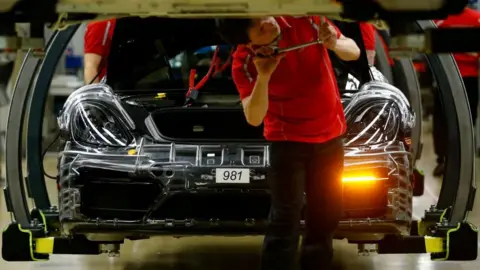 Reuters
ReutersThe European Union has watered down its plans to ban the sale of new petrol and diesel vehicles by 2035.
Current rules state that new vehicles sold from that date should be "zero emission", but carmakers, particularly in Germany, have lobbied heavily for concessions.
Under the European Commission's new plan, 90% of new cars sold from 2035 would have to be zero-emission, rather than 100%.
According to the European carmakers association, ACEA, market demand for electric cars is currently too low, and without a change to the rules, manufacturers would risk "multi-billion euro" penalties.
The remaining 10% could be made up of conventional petrol or diesel cars, along with hybrids.
Carmakers will be expected to compensate for the extra emissions created by these vehicles by using biofuels and so-called e-fuels, which are synthesised from captured carbon dioxide.
They will also be expected to use low-carbon steel made in the European Union in the vehicles they produce.
Opponents of the move have warned that it risks undermining the transition towards electric vehicles and leaving Europe exposed in the face of foreign competition.
The green transport group T&E has warned that the UK should not follow the EU's lead by weakening its own plans to phase out the sale of conventional cars under the Zero Emission Vehicles Mandate.
"The UK must stand firm. Our ZEV mandate is already driving jobs, investment and innovation into the UK. As major exporters we cannot compete unless we innovate, and global markets are going electric fast", said T&E UK's director Anna Krajinska.

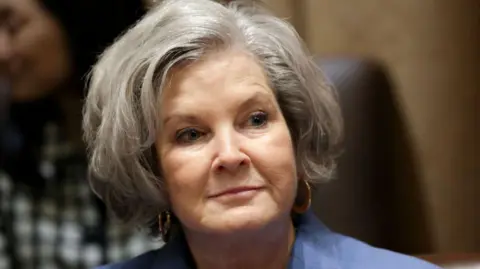 Getty Images
Getty ImagesWhite House Chief of Staff Susie Wiles has disputed portions of a Vanity Fair article in which she paints an unflattering picture of the Trump administration and many of its top officials.
In the interview, Wiles described Donald Trump as having an "alcoholic's personality" and Vice President JD Vance as having been a "conspiracy theorist" for a decade.
But in a post on X, Wiles said that Vanity Fair disregarded "significant context" to create "an overwhelmingly chaotic and negative narrative" about the administration.
Wiles, 68, played a key part in Trump's successful 2024 presidential campaign before becoming the first woman to be White House Chief of Staff.
Over the course of nearly a dozen interviews with Vanity Fair, Wiles talked about a wide range of issues, including handling of Epstein files, Trump's legal actions against politcal rivals, and also about personalities around the president.
She admitted that "there may be an element of" retribution in Trump's efforts to pursue criminal cases against political adversaries or perceived foes.
"I don't think he wakes up thinking about retribution," she added. "But when there's an opportunity, he will go for it."
Wiles is widely considered among the most powerful members of the Trump White House in his second term.
Prior to becoming Chief of Staff, Wiles had a long history working with Trump, including as his campaign manager in Florida in 2016 and as the head of his fundraising apparatus, Save America.
In the interview, she credits her upbringing with an alcoholic father as what enabled her to work with the president.
"High-functioning alcoholics or alcoholics in general, their personalities are exaggerated when they drink," she said. "So I'm a little bit of an expert in big personalities."
While the president does not drink, she said Trump has "an alcoholic's personality" and governs with the mindset that "there's nothing he can't do. Nothing, zero, nothing".
Among the other figures that Wiles commented on was JD Vance, a one-time critic of Trump who has since become a close ally and vice-president.
Wiles suggested that Vance's shift in perceptions was "sort of political".
Speaking to reporters at an event on Tuesday, Vance said he had not read the article, but that he only believes in conspiracy theories that are "true" - citing reports of former President Joe Biden's ill-health as an example.
Her strongest comments were reserved for tech billionaire Elon Musk, who led cost-cutting efforts at the Department of Government Efficiency - or Doge - before leaving the government in May.
Shortly thereafter, Musk and Trump had a public spat that saw the two men trade barbs and insults over social media.
Wiles described Musk as an "avowed Ketamine [user]" who "sleeps in a sleeping bag in the EOB", the Executive Office Building adjacent to the White House.
"He's an odd, odd duck, as I think geniuses are," she said. "You know, it's not helpful, but he is his own person."
Looking back on Musk's cost-cutting efforts, Wiles said that she was against the gutting of the US Agency for International Development, or USAID, saying she was "initially aghast" at the idea.
"I think that anybody that pays attention to government and has ever paid attention to USAID believed, as I did, that they do very good work," she recalled.
"Elon's attitude is you have to get it done fast. If you're an incrementalist, you just won't get your rocket to the moon," Wiles said. "With that attitude, you're going to break some china. But no rational person could think the USAID process was a good one. Nobody."
On Tuesday morning - hours after the Vanity Fair article was published - Wiles took to X, accusing the magazine of "disingenuously framed hit piece" aimed at her, Trump and other cabinet members.
"Significant context was disregarded and much of what I, and others, said about the team and the President was left out of the story. I assume, after reading it, that this was done to paint an overwhelmingly chaotic and negative narrative about the President and our team," she wrote.
When contacted for comment on the story, the White House also defended Wiles.
In a statement sent to the BBC, Press Secretary Karoline Leavitt said that Wiles "has helped President Trump achieve the most successful first 11 months in office of any President in American history."
"President Trump has no greater or more loyal advisor than Susie," Leavitt added. "The entire administration is grateful to her steady leadership and united fully behind her."
Speaking to reporters outside the West Wing later in the day, Leavitt accused Vanity Fair of "bias of omission" by excluding other interviews conducted with White House staff and taking Wiles' words "wildly out of context".
Trump and Musk have yet to comment on the Vanity Fair piece.

 Reuters
ReutersA California doctor who sold ketamine to Friends star Matthew Perry has been sentenced to eight months of home detention and three years of supervised release, making him the second person to be sentenced in the actor's death.
Dr Mark Chavez is among five people - including another doctor and a dealer known as the Ketamine Queen - who have pleaded guilty to drug-related charges stemming from sitcom star's 2023 death at his Los Angeles home.
The San Diego-based physician admitted to obtaining ketamine from his clinic and a wholesale distributor through a fraudulent prescription and sold it to Dr Salvador Plasencia, who supplied the dissociative anaesthetic to Perry.
Plasencia was sentenced earlier this month to 30 months in prison.
The multiyear federal investigation into Perry's death examined how the Emmy-winning actor acquired ketamine through an underground drug network in Hollywood.
Ketamine, a surgical anaesthetic, is used as a treatment for depression, anxiety and pain.
Perry, who had battled drug addiction and depression, had been prescribed the drug as part of his treatment but soon started seeking more than what he was allotted.
That ultimately led him to the drug ring that ensnared the two doctors, Perry's live-in assistant, a man named Erik Fleming and American-British dual-national Jasveen Sangha, the dealer known as the Ketamine Queen.
The latter three are due to be sentenced in the coming months.
A post-mortem examination of Perry found a high concentration of ketamine in his blood and determined that "acute effects" of the substance killed him.

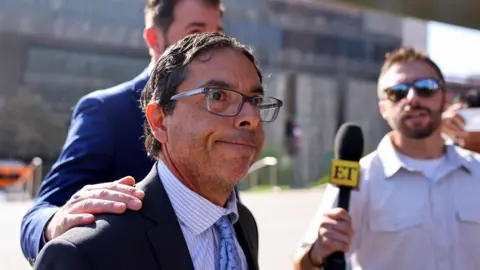 Reuters
ReutersProsecutors said Perry's assistant, Kenneth Iwamasa, worked with Chavez and Plasencia to provide the actor with more than $50,000 (£38,000) of ketamine in the weeks before his death.
In his plea agreement, Chavez admitted that he obtained ketamine from both his former clinic and a wholesale distributor through a fraudulent prescription. He submitted a fraudulent prescription for 30 ketamine lozenges under a former patient's name - without her knowledge or consent - to sell to Plasencia to give to Perry.
He confessed to selling 22 vials of liquid ketamine and nine ketamine lozenges to Plasencia, according to his October 2024 plea agreement.
The transaction was part of a broader scheme in which Chavez and Plasencia discussed exploiting Perry's addiction for financial gain by mocking him in their text exchanges.
"I wonder how much this moron will pay," Plasencia wrote to Chavez.
Chavez faced up to 10 years in federal prison. As part of his October 2024 plea deal, he surrendered his medical licence and passport.

 Getty Images
Getty ImagesThe United States has designated a notorious drug-trafficking organisation in Colombia as a terrorist group.
The US Treasury Department added the group, known as Clan del Golfo or Gulf Clan, to its list of Foreign Terrorist Organisations (FTOs).
The designation came just hours after US President Donald Trump signed an executive order classifying the drug fentanyl as a "weapon of mass destruction".
The two moves are seen as a further ramping-up of the Trump administration's war on drugs which has also seen it carry out more than 20 lethal strikes on boats suspected to be carrying drugs in the Caribbean and the Pacific.

 Getty
GettyMore than 90 people were killed in the strikes on the boats, which some legal experts say breach the law.
Clan del Golfo is the latest Latin American criminal group to be added to US Treasury's list of FTOs.
The group has been engaging in criminal activities for decades, mainly trafficking cocaine from Colombia - the largest producer of the drug - to destinations in the US and Europe.
But the Clan del Golfo, which is based in the northern Urabá region of Colombia, also plays a key role smuggling migrants through the Darién Gap, the expanse of jungle linking Colombia to Panama.
In a statement announcing its designation as an FTO, US Secretary of State Marco Rubio said the group was also behind terrorist attacks against public officials, law enforcement and military personnel, and civilians in Colombia.
It is estimated to have thousands of members and is thought to be the largest cocaine-trafficking gang currently operating in Colombia.
It joins three other Colombian criminal groups on the list of FTOs: the left-wing guerrilla group National Liberation Army (ELN), and two groups which broke away from the Revolutionary Armed Forces of Colombia - a Marxist guerrilla force - when it signed a peace agreement with the Colombian government in 2016.
The FTO designation of the Clan del Golfo by the US comes less than a fortnight after Colombia's President, Gustavo Petro, signed a landmark agreement with the criminal group aimed at bringing peace to the areas under its control.

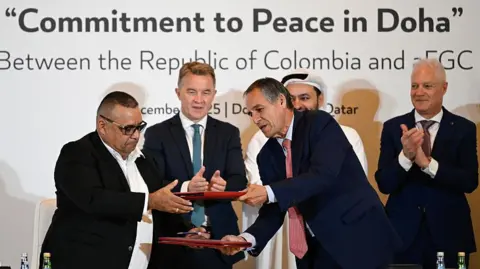 AFP via Getty Images
AFP via Getty ImagesPetro campaigned on a promise to bring "total peace" to the South American country, which has for decades suffered from cartel and guerrilla violence.
But more than three years after he took office, talks with most of the armed groups in the country have stalled or fallen apart altogether.
The announcement earlier this month that Colombian government officials had reached an agreement with the Clan del Golfo for the group to start taking steps towards laying down their arms was a win for Petro.
Part of that deal was an understanding that members of the Clan del Golfo would not face extradition to the UN.
The US designating Clan del Golfo as an FTO is likely to complicate the talks the Colombian government was having with the group.
Petro has not yet reacted to the move, but relations between the Colombian leader and the Trump administration have been acrimonious.

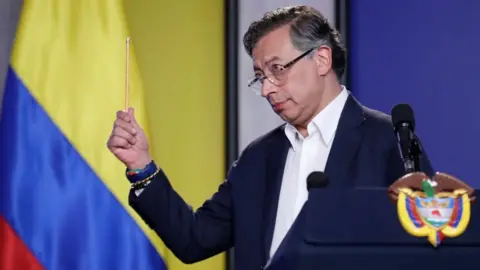 EPA
EPAPetro has called the lethal strikes the US has carried out on alleged drug-smuggling boats in the Pacific "murder".
In turn, Rubio has publicly labelled the Colombian president a "lunatic".
The immediate effect of the FTO designation is that the US will have more powers to punish the group.
Any assets the Clan del Golfo may hold at US financial institutions are frozen and individuals - even US citizens - who knowingly provide "material support" to the group can be prosecuted.
The move comes amid high tension in the region, with Trump repeatedly warning that "strikes on land" against "narco-terrorists" could soon follow those against alleged drug vessels at sea.
So far Trump has mainly homed in on Venezuelan President Nicolás Maduro, whom he accuses of leading another group the US has designated as an FTO: the Cartel of the Suns.
But asked by journalists about his plans for Venezuela on Friday, he not only again invoked the possibility of attacking drug smugglers on land but also appeared to hint at the possibility of doing so in Colombia.
"Colombia has at least three cocaine factories. That's a different country," he said.
And later he added: "But it's not only land strikes on Venezuela, it's land strikes on horrible people that are bringing in drugs and killing our people."
Trump has argued that the strikes on the alleged drug boats are saving US lives by preventing the powerful opioid fentanyl from reaching the US.
Fentanyl abuse has triggered one of the worst public health emergencies to hit the US, with more than 110,000 drug-related deaths in the US in 2023.
While the number of fatal drug overdoses fell by 25% in 2024, tackling this crisis remains one of Trump's priorities.
Trump has said that every strike on an alleged drug boat "saves 25,00 American lives" but US officials have provided no evidence that any of the vessels they struck carried fentanyl, which is 50 times as powerful as heroin and much deadlier than cocaine.
Counternarcotics experts have pointed out that neither Colombia nor Venezuela produce fentanyl and have questioned the Trump administration's focus on those countries.
The executive order Trump signed on Monday classifying fentanyl as a "weapon of mass destruction" suggests he may be engaging in a twin-track approach, continuing to target boats suspected of carrying cocaine as well as expanding his administration's powers to fight fentanyl-smuggling.
However, the move has been met with criticism by Mexico's President, Claudia Sheinbaum.
The Mexican leader insisted that the causes of drug use must be addressed.
She added that fentanyl was also used legally in hospitals for pain relief and questioned what the unintended effects of the classification of fentanyl as a weapon of mass destruction would be.

© Daniel Cole/Reuters

© Eric Lee for The New York Times
中国人工智能(AI)晶片制造商沐曦的股票,星期三(12月17日)在上海上市首日开盘即飙升近600%。
综合路透社、第一财经、,每日经济新闻报道,沐曦上周在火热的首次公开募股(IPO)中筹集了约6亿美元(7.75亿新元),随后迎来此次上市。
此次沐曦发行价格为每股104.66元(人民币,下同,19.19新元),对应发行后市值418.74亿元。上市首日,沐曦股价高开568.83%,报每股700元。按照每股104.66元的发行价计算,投资者中一签盈利约29.8万元。
沐曦是开发中国高性能通用图形处理器(GPU)产品的主要企业之一。
GPU是AI算力的核心基础,美国一直对输华AI晶片和相关技术实施管制,中国正加速培育本土GPU企业。摩尔线程、沐曦、壁仞科技和燧原科技在中国市场被统称为“国产GPU四小龙”,前三家已上市或准备上市,燧原科技仍处于首次公开募股辅导中。这些企业成立于2018年至2020年,主要聚焦AI算力和GPU研发。
中国春秋航空运营的往返日本佐贺和上海的定期航班将停运。
据日本共同社中文网报道,日本佐贺县星期二(12月16日)称,春秋航空运营的每周两个往返佐贺与上海的定期航班,将在12月22日至明年3月28日期间停运。
报道称,春秋航空未说明停运的理由,有可能是受到了中国政府提醒公民避免前往日本的影响。
春秋航空运营的佐贺与上海航班,在2012年成为定期航班。12月1日起,此前每星期一、三、五、日的四个往返航班,减至了每星期一、五的两个往返航班。
日本首相高市早苗11月初发表“台湾有事”言论后,中日关系陷入危机。北京连续出台措施反击,包括提醒公民近期避免赴日旅游或留学。多家中国航空公司随后宣布涉日航线可免费退改签。
联合国通过涉及全球贸易货物的条约,中国商务部说,公约充分彰显中国作为提案方,坚持真正多边主义、推动全球治理改革与完善的决心和行动。
中国商务部星期三(12月17日)在官网发布新闻稿称,第80届联合国大会于当地时间星期一(12月15日)正式审议通过《联合国可转让货物单证公约》并授权加纳于2026年举办签约仪式。
新闻稿称,中国是公约的提案方和主要推动者,公约的达成是中国秉持人类命运共同体理念,积极落实习近平主席提出的四大全球倡议的重要举措。公约充分彰显中国坚持真正的多边主义,努力为全球提供公共产品,推动全球治理改革与完善的决心和行动。
中国商务部介绍,为填补跨境铁路运单物权凭证问题相关国际规则的空白,中国2019年7月向联合国国际贸易法委员会第52届委员会会议提交正式提案,建议针对此问题研究制定新的国际规则。2025年7月和12月,联合国贸法会第58届委员会会议和第80届联合国大会分别审议通过公约草案,公约至此落地达成。
根据新闻稿,公约旨在解决包括铁路运单在内的各类跨境运输单证的物权效力问题,为运输单证的融资交易提供法制保障,缓解企业尤其是中小企业的资金压力,降低陆上贸易交易成本,提高交易效率,为全球贸易繁荣和经济发展注入新动力。
台湾国防部星期三称,中国大陆第三艘航空母舰福建舰星期二驶过台湾海峡。

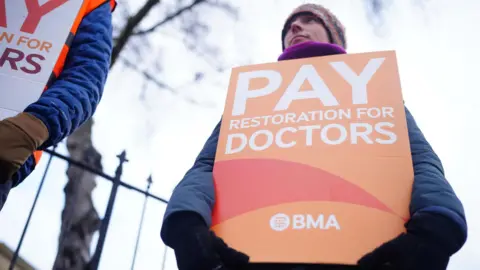 PA Media
PA MediaPatients are being told to expect disruption as doctors start their five-day strike in England, with NHS bosses saying they are struggling to keep as many services going as they have done in recent walkouts.
NHS England said with a wave of flu placing pressure on hospitals, non-urgent services would be affected by the strike which begins at 07:00 Wednesday.
This is the 14th walkout by resident doctors, the new name for junior doctors, in the long-running pay dispute.
Health Secretary Wes Streeting said the strike had been timed to inflict most damage on the NHS and put patients at risk, but the British Medical Association said it would work with NHS bosses to ensure patient safety.
The strike is being held after the two sides held last-minute talks on Tuesday afternoon.
The talks were described as "constructive" by the government, but not enough progress had been made to call off the strike.
Resident doctors represent nearly half of the doctors working in the NHS. They will walk out of both emergency and non-urgent care with senior doctors drafted in to provide cover.
In the two most recent strikes – in July and November – NHS England said it was able to keep the majority of non-urgent operations and treatments, such as hip and knee replacements, going.
But NHS England said it expected more disruption this time. Concern has also been expressed that hospitals may struggle to discharge patients in time for Christmas as the doctors who are working concentrate on providing strike cover.
Medical director Prof Meghana Pandit said: "These strikes come at an immensely challenging time for the NHS, with record numbers of patients in hospital with flu for this time of year.
"Staff will come together as they always do, going above and beyond to provide safe care for patients and limit disruption.
"But sadly more patients are likely to feel the impact of this round of strikes than in the previous two – and staff who are covering will not get the Christmas break they deserve with their families."
Streeting added: "We have been working right up to today to try and avert these strike actions.
"Everyone knows the period leading up to Christmas and into the New Year are always the busiest for the NHS. With super flu, this year is harder.
"And that double whammy of flu plus strikes means that there is an additional burden now on other NHS staff."
NHS England said GP practices will continue to be open and urgent and emergency care services will be available for those who need them.
But even then there is likely to be some disruption. Cheltenham General Hospital's emergency department is closing for emergencies during the strike - it will remain open for minor injuries - with patients advised to use nearby Gloucestershire Royal Hospital.
NHS England said the public should use 111 online as the first port of call for urgent, but not life-threatening issues during the strike.
Patients who need emergency medical care should continue to use 999 or come forward to A&E as normal, it added.
The strike is going ahead despite a new offer from the government being made last week, which included increasing the number of speciality training posts and covering out-of-pocket expenses like exam fees.
The speciality training jobs, which resident doctors start in year three of their training after completing medical school, have become highly competitive.
This year 30,000 applicants went for 10,000 jobs – although some of the applicants were doctors from abroad.
Dr Tom Twentyman is one of those who lost out after trying to secure an emergency medicine post. He says finding a job is an "absolute nightmare".
Since then he has been struggling to find work, juggling a handful of locum shifts each month at the same time as applying for more than 40 short-term contracts at hospitals across the country – one of which he now secured.
But this will not count towards his training, so he will now look to reapply next year.
"Some of the job adverts were coming down within two hours of going up after they received 650 applications, which is clearly an enormous number to shortlist," he says.

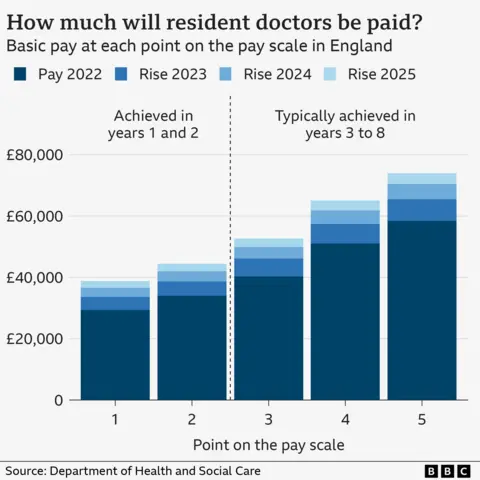
On Monday the BMA announced its members had voted to continue with the strike – effectively rejecting the offer in the process – after the union agreed to hold an online poll of members.
BMA resident doctor leader Dr Jack Fletcher described it as a "resounding response" and said the government needed to go further on jobs as well as pay.
Streeting has maintained he will not discuss pay as doctors have received pay rises totalling nearly 30% over the past three years.
The BMA argues that, despite the pay rises, resident doctors' pay is still a fifth lower than it was in 2008, once inflation is taken into account.
Dr Fletcher added: "It is well past the time for ministers to come up with a genuinely long-term plan.
"If they can simply provide a clear route to responsibly raise pay over a number of years and enough genuinely new jobs instead of recycled ones, then there need not be any more strikes for the remainder of this government."
But the BMA said it was committed to ensuring patient safety.
"We will be in close contact with NHS England throughout the strikes to address safety concerns if they arise," the union added.
Paul Doyle's loss of temper on the day of the Liverpool parade attack, described by the sentencing judge as "incomprehensible", may never be fully explained.
There seemed little cause for the 54-year-old to feel so aggrieved by the crowds blocking the roads as they celebrated at Liverpool FC's Premier League victory parade on 26 May.
Whatever the reason, he is now serving a sentence of 21 years and six months after pleading guilty to 31 offences including dangerous driving, affray and causing grievous bodily harm with intent.
This is how Doyle's increasing aggression on the roads developed into catastrophe over one afternoon, starting at 12:34 BST when a friend who he had agreed to drive to the parade arrived at his home.

 PA Media
PA Media12:34 – Paul Doyle's friend Dave Clark and his family arrive at his home in Croxteth, Liverpool. The Clark family are Liverpool fans and Doyle, an Everton fan, has agreed to drive them into the city centre to watch the parade.
12:41 – Doyle leaves home with Mr Clark and his family. On the "mundane" journey into the city, they speak about house prices, schools, football, cars, their common work in IT and family matters.
He then drops them off on Exchange Street East, where footage showed him driving calmly and following the traffic measures on Dale Street.

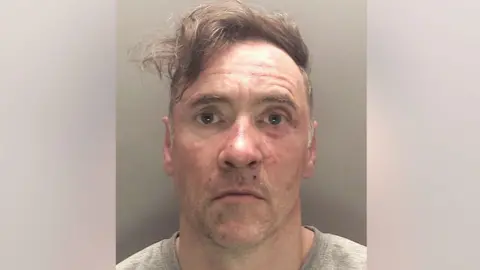 CPS
CPS13:35 – Doyle arrives home after dropping his friends off on Exchange Street East. The court heard that while it did not form part of the dangerous driving charge, he "drove in a markedly more aggressive way" on his way home, jumping lanes and undertaking other vehicles.
14:30 – The victory parade starts at Allerton Maze, in the the south of Liverpool.
17:24 – Doyle sends Mr Clark a message asking "how's it going?" and is told his friend is on Castle Street, close to Dale Street and Water Street.

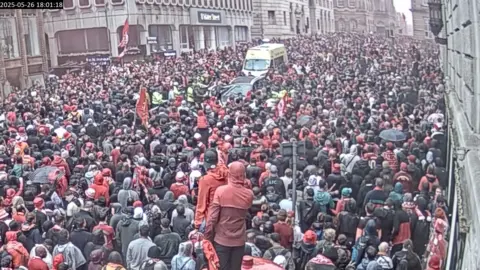 MerseysidePolice
MerseysidePolice17:29 – Doyle sets off from his house to return to the city centre. He instructs the sat-nav system in his Ford Galaxy car to take him to Castle Street. On the way, he undertakes several cars and runs a red light.
17:40 – The Liverpool FC parade finishes when the buses arrive outside the Liver Building on the waterfront.
17:48 – Mr Clark sends Doyle a message telling him signal is poor. Doyle says he will be at Castle Street in about 10 minutes but does not reply when Mr Clark asks if he wants them to walk anywhere. Mr Clark also tells him he might find the area of Castle Street blocked.

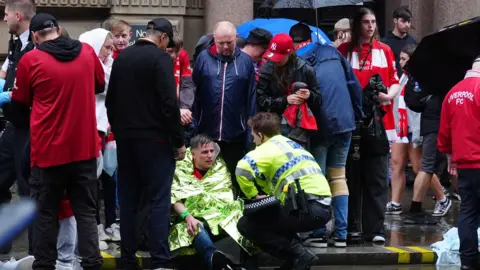 PA Media
PA Media17:54 – Doyle arrives on Dale Street from Byrom Street, having undertaken a series of other vehicles at traffic lights and gone around a roundabout in the wrong lane, coming close to pedestrians who are crossing the road.
He uses his horn and presses on down the road, despite a dense crowd of fans heading back from the waterfront. He drives through a red light at the junction with Stanley Street.
17:58 – A man walking with his child, who has not been identified, becomes concerned about Doyle's driving and places his foot on the bumper of the Ford Galaxy as he moves his child out of the way. He points at Doyle, who responds by shouting: "It's a [expletive] road."
After this interaction, Doyle continues to drive in the direction of the increasingly worried crowd, some of whom bang on his car roof.
He blasts his car horn and shouts further obscenities. Adults jump out of his way and children are pulled from his path.

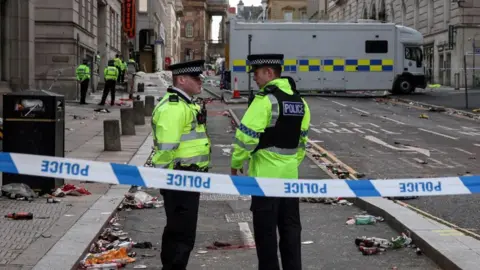 Reuters
ReutersHe initially stops ahead of traffic cones put in place to divert traffic away from Water Street, which is full of fans, but then steers into the left lane.
The first person he hits is Jack Trotter, 23, who attempts to get out of the way but suffers an injury to his leg. He then drives into a group of people who are thrown onto his bonnet. He hits another group of people and then drives into a 10-year-old girl, before shouting "[Expletive] move".
He carries on down Water Street, striking more people, including Jacqueline McClaren, 60, and paramedic Jay Vernon, 34. He reverses and collides with an ambulance.
Doyle stops for a short time and fans surround his vehicle. One, ex soldier Dan Barr, opens the rear passenger door and gets into the car.
Doyle then accelerates again, hitting Simon Nash, who is thrown into the air. Driving sharply to the right, he hits Sheree Aldridge and the pram she is pushing, carrying six-month-old baby Teddy Eveson.
The pram, with Teddy in, is thrown into the air but the baby is uninjured. Ms Aldridge suffers a serious injury to her left thigh.
From the back of the car, Mr Barr leans forward and holds the automatic gear selector in park mode. Doyle continues to try and accelerate but eventually the car, with four people underneath it, comes to a stop.
18:01 – Doyle is dragged from his vehicle and quickly shielded from the crowd by police officers. In the two minutes since he drove into the crowd, 134 people have been hit.
Doyle pleaded not guilty to 31 charges when he appeared at Liverpool Crown Court on 4 September, with a trial scheduled for November.
Jurors were sworn in on 25 November but he changed his pleas the following day as the prosecution prepared to open its case.
Listen to the best of BBC Radio Merseyside on Sounds and follow BBC Merseyside on Facebook, X, and Instagram. You can also send story ideas via Whatsapp to 0808 100 2230.

 BBC
BBCUS President Donald Trump has said he is ordering a "a total and complete" blockade of all sanctioned oil tankers going into and out of Venezuela.
In a post on Truth Social, he accused Venezuela of stealing US assets, such as oil and land, and of "Terrorism, Drug Smuggling, and Human Trafficking".
"Therefore, today, I am ordering A TOTAL AND COMPLETE BLOCKADE OF ALL SANCTIONED OIL TANKERS going into, and out of, Venezuela," he added.
His post came a week after the US seized an oil tanker off the coast of Venezuela – a move that marked a sharp escalation Washington's pressure campaign against Venezuelan leader Nicolás Maduro's government.
In the post, the US president said Venezuela was "completely surrounded by the largest Armada ever assembled in the History of South America".
He added that it will "only get bigger" and "be like nothing they have ever seen before".
Trump also accused Maduro's government of using stolen oil to "finance themselves, Drug Terrorism, Human Trafficking, Murder, and Kidnapping".
Venezuela has not yet responded to Trump's latest remarks.
The Trump administration has repeatedly accused Venezuela of drug smuggling and since September the US military has killed at least 90 people in strikes on boats it has alleged were carrying fentanyl and other illegal drugs to the US.
In recent months, the US has also moved warships into the region.
Venezuela - home to some of the world's largest proven oil reserves - has, in turn, accused Washington of seeking to steal its resources.
This breaking news story is being updated and more details will be published shortly. Please refresh the page for the fullest version.
You can receive Breaking News on a smartphone or tablet via the BBC News App. You can also follow @BBCBreaking on X to get the latest alerts.